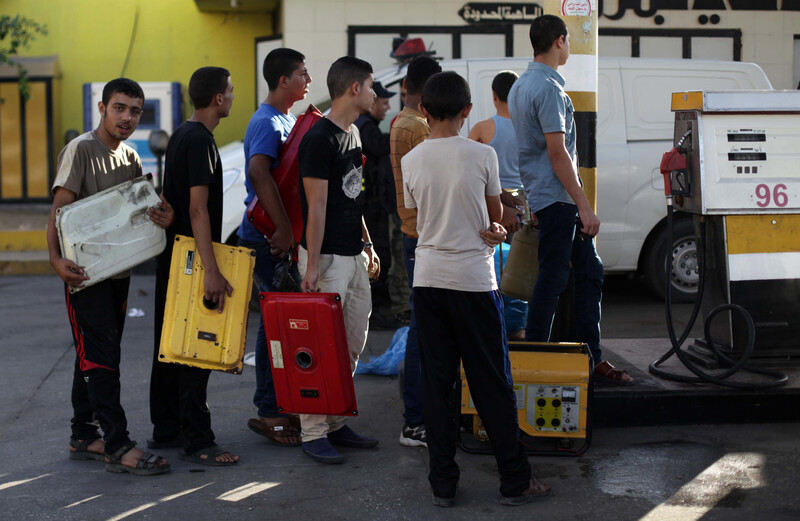Rights and Accountability 5 September 2013

Palestinians wait at a gas station in Gaza City on 1 September 2013, as tightening blockade has worsened fuel crisis.
APA imagesSince the 3 July military coup against Egypt’s elected president Muhammad Morsi, the military regime has destroyed almost all the vital underground supply tunnels under the Gaza-Egypt border.
This week, Egypt began demolishing houses along its side of its border with Gaza, a futile and criminal Israeli-style tactic, that is seen as a prelude to establishing a “buffer zone” to further isolate Gaza.
As a result of these and other Egyptian measures, supplies of some critical medicines have hit zero, the construction industry has collapsed, and the Rafah crossing, the only entry and exit for most Gazans, is frequently closed.
The population of Gaza still faces 12-hour daily blackouts due to Israel’s destruction of the electricity infrastructure, but even the relief provided by noisy and often dangerous portable generators is fading into darkness as fuel supplies run out.
Slow death
A new report, “Slow Death; The Collective Punishment of Gaza has reached a Critical Stage,” from the human rights monitoring group Euro-Mid Observer, highlights the acute crisis that compounds the effects of the prolonged Israeli blockade.
Ten facts about the Gaza blockade
The report is worth reading in full, but these ten facts about the impact of the blockade capture the scale of the mounting catastrophe and underscore the urgent need for pressure on Israel to end it and for Egypt to end its complicity.
- According to the UN’s Office for the Coordination of Humanitarian Affairs (OCHA), 57 percent of Gaza households are food insecure as of July 2013; however, if the current Israeli and Egyptians measures remain as they are, 65 percent of Gaza households will be food insecure (World Food Program estimate, June 2010).
- As of August 2013, more than a third (35.5 percent) of those able and willing to work are unemployed (Palestinian Central Bureau of Statistics) – one of the highest unemployment rates in the world. Economists expect that the continuous closure of the tunnels will lead to a sharp increase in the unemployment level (43 percent by the end of 2013 compared with 32 percent in June 2013).
- The continuous closure of the tunnels will lead to a 3 percent decline in the growth by the end of 2013 compared with 15 percent as of June 2013.
- The construction sector is working at less than 15 percent of its previous capacity, leading to more than 30,000 losses in job opportunities since July 2013.
- A longstanding electricity deficit, compounded by shortages in fuel needed to run Gaza’s power plant, results in power outages of up to 12 hours a day (UN OCHA, July 2013).
- Only a quarter of households receive running water every day, during several hours only.
- More than 90 percent of the water extracted from the Gaza aquifer is unsafe for human consumption.
- Some 90 million liters of untreated and partially treated sewage are dumped in the sea off the Gaza coast each day, creating public health hazards.
- Over 12,000 people are currently displaced due to their inability to reconstruct their homes, destroyed during hostilities (UNOCHA, July 2013).
- The economy has endured severe losses worth $460 million in all economic sectors within the past two months (Ministry of Economy- Gaza).
Collective punishment, collective crime
Although it remains the occupying power, Israel declared Gaza a “hostile entity” in 2007 and its then Prime Minister Ehud Olmert declared, “We will not allow the opening of the crossings to Gaza and outside of Gaza to the extent that it will help them bring back life into a completely normal pace.”
These and other Israeli official statements quoted in the Euro-Mid report highlight that the catastrophe in Gaza is a calculated and intended effect of the siege, making it a war crime and collective punishment under international law.
Complicity
Euro-Mid calls on the “international community,” to pressure Israel to end the blockade.
That call is right, but it is an unavoidable fact that the siege would not have lasted seven long years already without the complicity and support of the “international community” in the form of the United States and its allies, particularly the European Union and compliant Arab regimes.
The siege is collective punishment of Palestinians in Gaza, but it is also a collective crime.





Comments
Wishing I could help.
Permalink sigdaddy replied on
Please know not all Americans are bad, and that just like with all countries and peoples there are bad apples and most often they are the ones in charge.. One day we will be a united world, peace will rule over the iron fists of extremists, Zionist, Christian or Islamic apartheid religious leaders hell bent on keeping thousand year differences in opinion or interpretation alive and burning instead of putting the fires out and loving our neighbors as our brothers and sisters... Peace and One Love my friends.
The world's hopes and prayers
Permalink Cindy Wilmore replied on
The world's hopes and prayers are with the Gazans. In the words of Tracy Chapman, "Hold on."